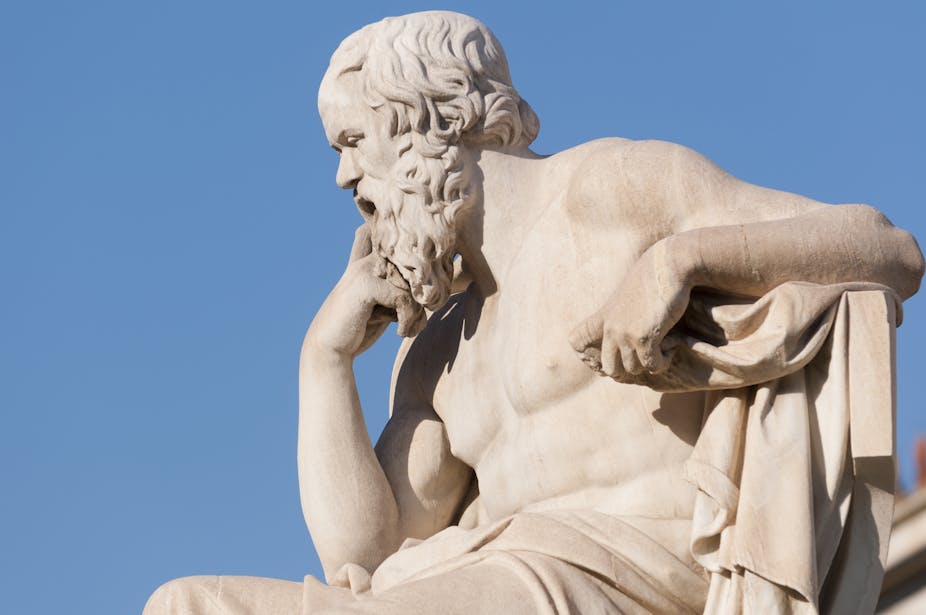What is wisdom?
Some would say that I am unwise for seeking to answer such a big question here. That is a useful point – to know what something is, it can help to get clear on what it’s not. Let’s start with that intuitive suggestion: it is unwise to try to answer the question of what wisdom is in the space of an article of 1000 words.
Another example of a lack of wisdom: proclaiming oneself to be wise. The ancient Greek philosopher Socrates is famous for having been called wise in part because he would not label himself wise. Conversely, had he called himself wise, he probably would not have deserved the label.
More examples of a lack of wisdom: spending too much time playing DoodleJump on one’s phone instead of writing an essay that’s due soon; making mistakes without learning from them (and thereby being akin to a dog that returns to its vomit, as per Proverbs 26:11 in the Bible); believing that skin colour is strongly correlated with intellectual and moral traits; saying in a tweet to a South African audience that colonialism had some good consequences.
Conversely, let us consider some good examples of wisdom. I think the suggestion that people’s questions are often implicitly statements is wise, as is the further suggestion that people’s statements are often implicitly requests. There was wisdom in the way that Paris climate change talks in 2015 were conducted, namely, by having drawn on indigenous southern African conflict resolution techniques to good effect. I, and I presume readers familiar with their work, appreciate the wisdom of scholar-writer-activists such as George Orwell, Arthur Koestler, Diane Ackerman, Toni Morrison and Wole Soyinka.
What do the examples of wisdom have that the others are missing? What is present in wisdom that is absent in folly?
The nub of the matter
A common answer these days from English-speaking philosophers is that wisdom is a matter of knowing what is fundamental and then living well in the light of that. As philosopher Robert Nozick suggests,
Wisdom is an understanding of what is important, where this understanding informs a (wise) person’s thought and action.
One might add that the actions are undertaken with a strategic awareness of limits and potential obstacles.
This account of wisdom is part of the story, but is incomplete. A wise person has certain beliefs and she makes certain sorts of decisions because of them, but I submit that a person can also be wise or unwise insofar as she exhibits particular feelings.
Contemporary academic philosophers who have written about wisdom have focused nearly exclusively on what is rational, either theoretically and practically, and have failed to acknowledge our emotional side. (If I am right that philosophers haven’t understood wisdom well, then there is some irony in this, for the word “philosophy” comes from the Greek for love of wisdom.)
Ignorant mindset, wrongful choice, inapt attitude
Consider that racism, xenophobia and the like are unwise partly insofar as they involve hating people because they belong to a certain group whose members share merely skin deep features. The lack of wisdom consists not merely of the false beliefs that have led to the hatred or the poor choices that xenophobes might make because of their hatred. The hatred itself is unwise, and would be even if it were never expressed or acted upon.
Racism and xenophobia aren’t merely a matter of ignorant mindset and wrongful choice. They can also consist of having a shameful, pathetic attitude towards other people. One is lacking in wisdom to some degree insofar as one feels disgust at interracial romantic relationships.
Hating or being repulsed by other people can be unwise, as can exhibiting such emotions towards oneself. Being humble à la Socrates is one thing, but deeming oneself unworthy and feeling bad about oneself at the core is something else. Of course, it can be appropriate to feel measured guilt for having done particular wrongs one should not have – that, in fact, would be wise! But one would be missing some wisdom if one’s general attitude towards oneself were that one is unimportant or does not merit respect and affection.
Self-hatred often does lead to bad decisions, such as failing to take responsibility for one’s mistakes, being overly sensitive to slights, and lashing out at others (particularly on email, it has seemed to me lately). However, I submit that self-hatred would not merely lead to unwise choices, but also evince a lack of wisdom in itself.
Hatred, disgust and guilt are negative emotions. It can also be intuitively wise or unwise to have certain positive emotions, such as love, pride and gratitude. It would be unwise for you to love a manipulative abuser who will never really love you back. True, it would be unwise in large part because you’d be likely to get hurt, but another part of the foolishness is that the lowlife does not deserve your love. Wouldn’t a wise person love what is truly worth loving?
Should one seek wisdom?
It is a tall order to try to become wise. And the bad news of this article is that it appears harder than at least many philosophers have thought. Becoming wise appears to mean not just acquiring knowledge of what is important and choosing well in the light of it, but also exhibiting certain emotions. That’s an extra condition, and, furthermore, it’s unfortunately harder for most of us to control our feelings than it is our decisions.
It’s starting to appear to be unwise to try to become wise, given how difficult it would be to achieve. Does that make any sense? Is wisdom such that it can be unwise to pursue it?
I cannot say here. After all, we knew it would be foolish to try to answer the question of what wisdom is in the space of an article.

